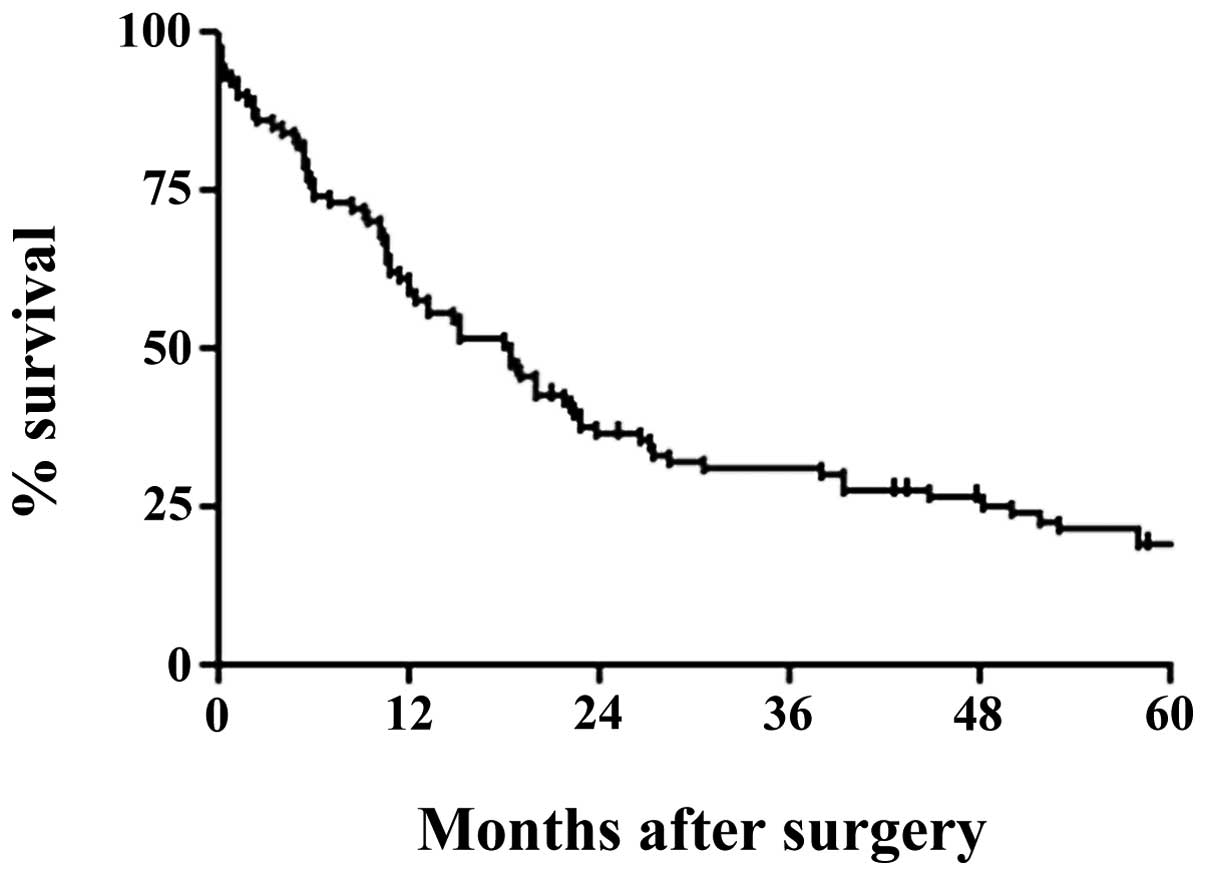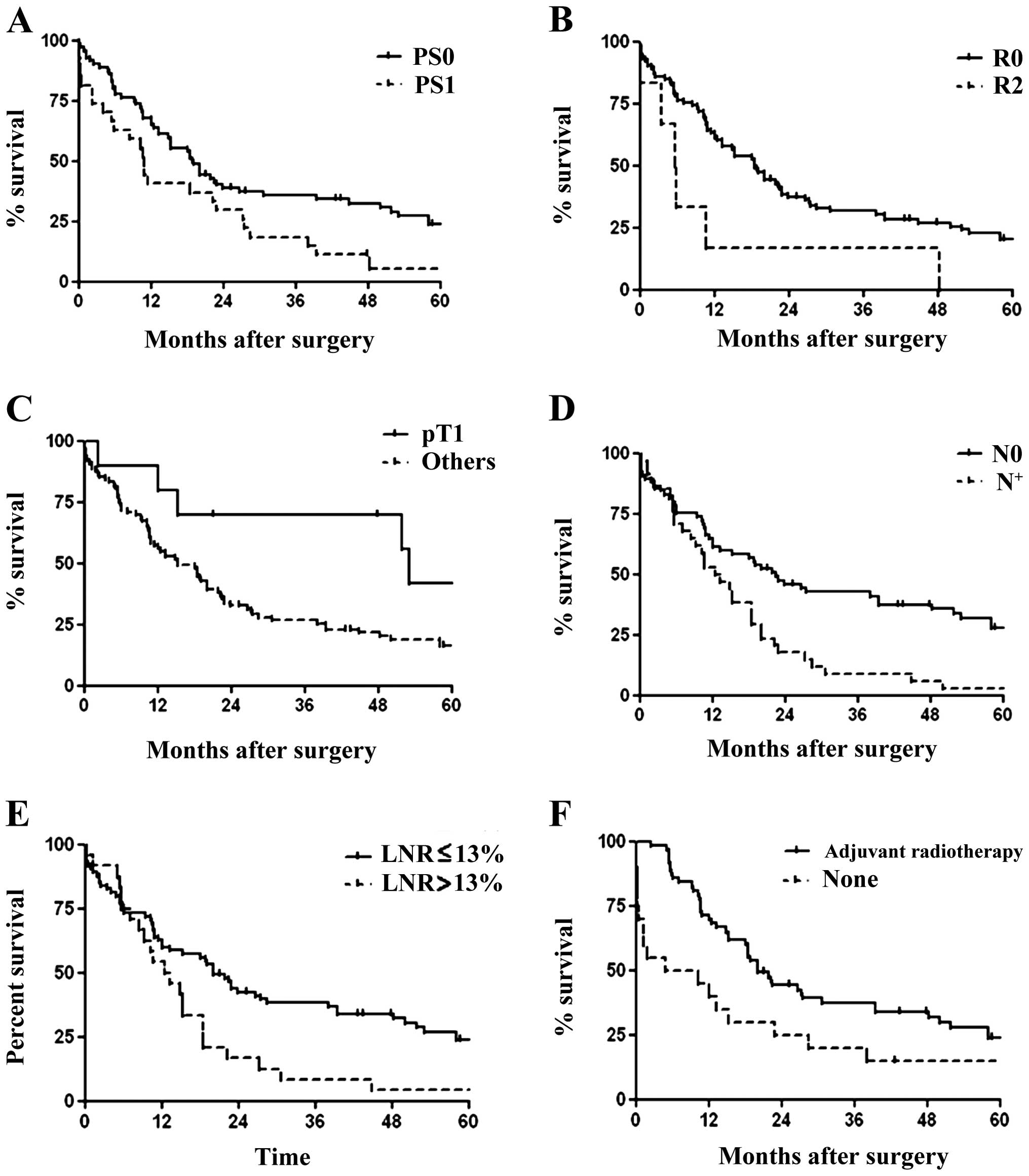|
1
|
Robinson BW and Lake RA: Advances in
malignant mesothelioma. N Engl J Med. 353:1591–1603. 2005.
View Article : Google Scholar : PubMed/NCBI
|
|
2
|
Treasure T, Lang-Lazdunski L, Waller D,
Bliss JM, Tan C, Entwisle J, et al: Extra-pleural pneumonectomy
versus no extra-pleural pneumonectomy for patients with malignant
pleural mesothelioma: clinical outcomes of the Mesothelioma and
Radical Surgery (MARS) randomised feasibility study. Lancet Oncol.
12:763–772. 2011. View Article : Google Scholar
|
|
3
|
Cao CQ, Yan TD, Bannon PG and McCaughan
BC: A systematic review of extrapleural pneumonectomy for malignant
pleural mesothelioma. J Thorac Oncol. 5:1692–1703. 2010. View Article : Google Scholar : PubMed/NCBI
|
|
4
|
Van Schil P: Malignant pleural
mesothelioma: staging systems. Lung Cancer. 49:S45–S48.
2005.PubMed/NCBI
|
|
5
|
Rusch VW: A proposed new international TNM
staging system for malignant pleural mesothelioma. From the
International Mesothelioma Interest Group. Chest. 108:1122–1128.
1995. View Article : Google Scholar : PubMed/NCBI
|
|
6
|
Boutin C, Dumortier P, Rey F, Viallat JR
and De Vuyst P: Black spots concentrate oncogenic asbestos fibers
in the parietal pleura. Thoracoscopic and mineralogic study. Am J
Respir Crit Care Med. 153:444–449. 1996. View Article : Google Scholar : PubMed/NCBI
|
|
7
|
Okiemy G, Foucault C, Avisse C, Hidden G
and Riquet M: Lymphatic drainage of the diaphragmatic pleura to the
peritracheobronchial lymph nodes. Surg Radiol Anat. 25:32–35. 2003.
View Article : Google Scholar : PubMed/NCBI
|
|
8
|
Flores RM, Routledge T, Seshan VE, Dycoco
J, Zakowski M, Hirth Y and Rusch VW: The impact of lymph node
station on survival in 348 patients with surgically resected
malignant pleural mesothelioma: implications for revision of the
American Joint Committee on Cancer staging system. J Thorac
Cardiovasc Surg. 136:605–610. 2008. View Article : Google Scholar
|
|
9
|
Edwards JG, Stewart DJ, Martin-Ucar A,
Muller S, Richards C and Waller DA: The pattern of lymph node
involvement influences outcome after extrapleural pneumonectomy for
malignant mesothelioma. J Thorac Cardiovasc Surg. 131:981–987.
2006. View Article : Google Scholar : PubMed/NCBI
|
|
10
|
de Perrot M, Uy K, Anraku M, Tsao MS,
Darling G, Waddell TK, et al: Impact of lymph node metastasis on
outcome after extrapleural pneumonectomy for malignant pleural
mesothelioma. J Thorac Cardiovasc Surg. 133:111–116.
2007.PubMed/NCBI
|
|
11
|
Sugarbaker DJ, Flores RM, Jaklitsch MT,
Richards WG, Strauss GM, Corson JM, et al: Resection margins,
extrapleural nodal status, and cell type determine postoperative
long-term survival in trimodality therapy of malignant pleural
mesothelioma: results in 183 patients. J Thorac Cardiovasc Surg.
117:54–65. 1999. View Article : Google Scholar
|
|
12
|
Chailleux E, Dabouis G, Pioche D, de
Lajartre M, de Lajartre AY and Rembeaux Aand Germaud P: Prognostic
factors in diffuse malignant pleural mesothelioma. A study of 167
patients. Chest. 93:159–162. 1988. View Article : Google Scholar : PubMed/NCBI
|
|
13
|
Aziz T, Jilaihawi A and Prakash D: The
management of malignant pleural mesothelioma; single centre
experience in 10 years. Eur J Cardiothorac Surg. 22:298–305.
2002.PubMed/NCBI
|
|
14
|
Richards WG, Godleski JJ, Yeap BY, Corson
JM, Chirieac LR, Zellos L, et al: Proposed adjustments to
pathologic staging of epithelial malignant pleural mesothelioma
based on analysis of 354 cases. Cancer. 116:1510–1517. 2010.
View Article : Google Scholar
|
|
15
|
Abdel Rahman AR, Gaafar RM, Baki HA, El
Hosieny HM, Aboulkasem F, Farahat EG, et al: Prevalence and pattern
of lymph node metastasis in malignant pleural mesothelioma. Ann
Thorac Surg. 86:391–395. 2008.PubMed/NCBI
|
|
16
|
Nwogu CE, Groman A, Fahey D, Yendamuri S,
Dexter E, Demmy TL, et al: Number of lymph nodes and metastatic
lymph node ratio are associated with survival in lung cancer. Ann
Thorac Surg. 93:1614–1620. 2012. View Article : Google Scholar : PubMed/NCBI
|
|
17
|
Wang CL, Li Y, Yue DS, Zhang LM, Zhang ZF
and Sun BS: Value of the metastatic lymph node ratio for predicting
the prognosis of non-small-cell lung cancer patients. World J Surg.
36:455–462. 2012. View Article : Google Scholar : PubMed/NCBI
|
|
18
|
Mariette C, Piessen G, Briez N and
Triboulet JP: The number of metastatic lymph nodes and the ratio
between metastatic and examined lymph nodes are independent
prognostic factors in esophageal cancer regardless of neoadjuvant
chemoradiation or lymphadenectomy extent. Ann Surg. 247:365–371.
2008. View Article : Google Scholar
|
|
19
|
Wolf AS, Daniel J and Sugarbaker DJ:
Surgical techniques for multimodality treatment of malignant
pleural mesothelioma: extrapleural pneumonectomy and
pleurectomy/decortication. Semin Thorac Cardiovasc Surg.
21:132–148. 2009. View Article : Google Scholar
|
|
20
|
Graham AN, Chan KJ, Pastorino U and
Goldstraw P: Systematic nodal dissection in the intrathoracic
staging of patients with non-small cell lung cancer. J Thorac
Cardiovasc Surg. 117:246–251. 1999. View Article : Google Scholar : PubMed/NCBI
|
|
21
|
Naruke T, Suemasu K and Ishikawa S: Lymph
node mapping and curability at various levels of metastasis in
resected lung cancer. J Thorac Cardiovasc Surg. 76:832–839.
1978.PubMed/NCBI
|
|
22
|
Riquet M, Manac’h D, Dupont P, Dujon A,
Hidden G and Debesse B: Anatomic basis of lymphatic spread of lung
carcinoma to the mediastinum: anatomo-clinical correlations. Surg
Radiol Anat. 16:229–238. 1994. View Article : Google Scholar : PubMed/NCBI
|
|
23
|
Mujoomdar AA and Sugarbaker DJ:
Hyperthermic chemoperfusion for the treatment of malignant pleural
mesothelioma. Semin Thorac Cardiovasc Surg. 20:298–304. 2008.
View Article : Google Scholar : PubMed/NCBI
|
|
24
|
Steele JP, Klabatsa A, Fennell DA,
Palläska A, Sheaff MT, Evans MT, et al: Prognostic factors in
mesothelioma. Lung Cancer. 49:S49–S52. 2005. View Article : Google Scholar
|
















